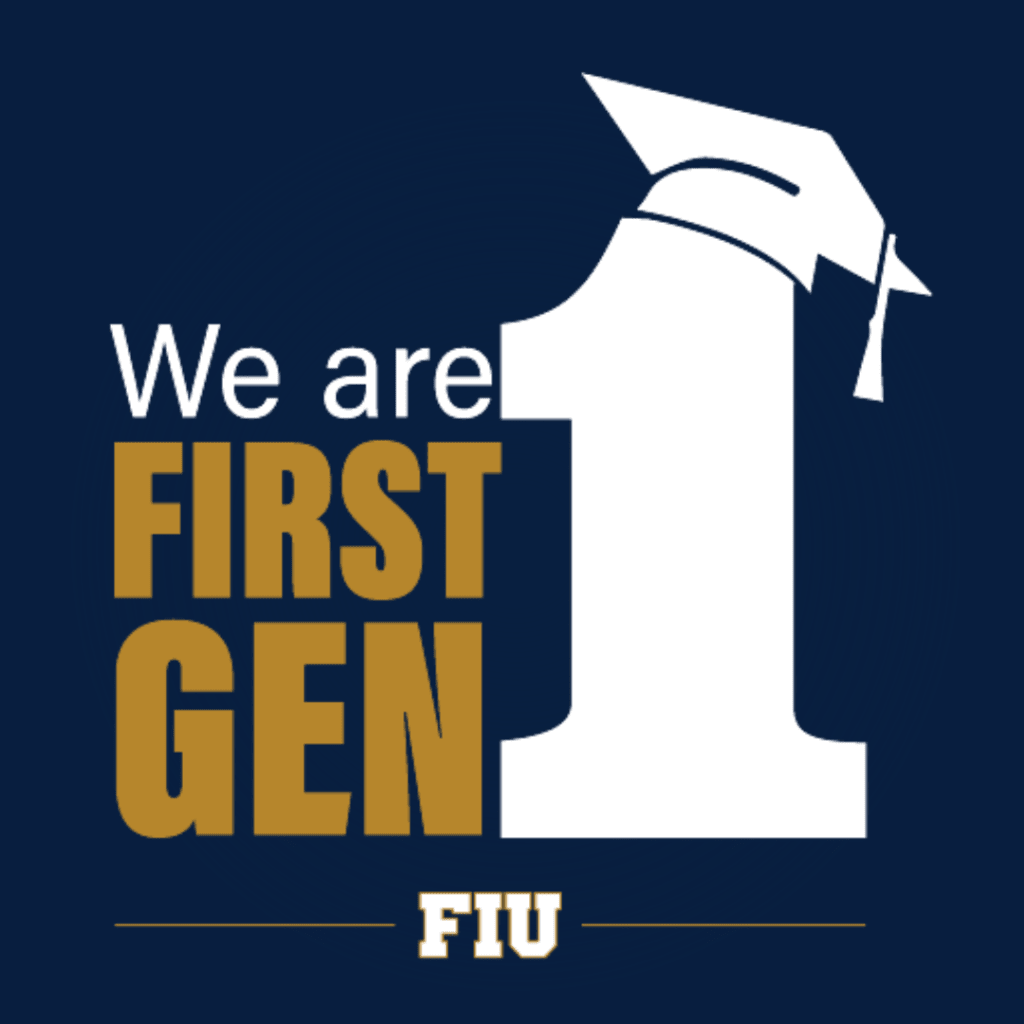Originally published March 16, 2023 on news.fiu.edu.
Written by Clara-Meretan Kiah
Florida International University has once again been recognized for its commitment to the success of first-generation college students. FIU is one of 22 U.S. colleges and universities to be designated a First Scholars institution in 2023 by the Center for First-Generation Student Success, a national initiative by NASPA and The Suder Foundation that is dedicated to the advancement of students who are among the first generation in their families to attain bachelor’s degrees.
One in five FIU undergraduates is first-generation. In recognition of its programs and initiatives supporting these students, FIU has been designated by the center as a First Forward institution since 2017. Achieving the prestigious First Scholars milestone – an advanced designation – is recognition of FIU’s university-wide priority to intentionally provide wrap-around support services, financial assistance and more to support its first-generation students, who face unique challenges as they attempt to break familial cycles and chart new paths.
“Our first-generation Panthers are among our hardest-working students, especially considering the challenges they face navigating university life without the advice and past experiences of family members who have already been through the process themselves,” said Phillip Lloyd Hamilton, assistant vice president for Student Equity and Support. “Their determination to succeed is an inspiration, and we are committed to supporting their academic and professional achievements during and beyond their FIU education.”
First Scholars is the second phase in the First Scholars Network journey – after First Forward – and FIU will now be eligible to work toward attaining Champion Campus status, the center’s highest designation.
The First Scholars Network uses a phased approach designed to scaffold learning and achievement of institutions over time, providing participants with the opportunity to engage in student-centered, systemic transformation through an ecosystem of resources and expert guidance.
“After seeing such exciting network progress and leadership, the center is pleased to welcome FIU as a new First Scholars institution,” said Dr. Sarah E. Whitley, vice president of the Center for First-Generation Student Success. “Through every step, it was evident that FIU is not only invested in serving first-generation students, but is prepared to make a long-term commitment to radically change the way first-generation students are served and to employ strategies for sustainability and scale that result in intentional impact.”
FIU is a Minority-Serving Institution, and its approach to first-generation student success focuses on three main initiatives:
- The First-Generation Scholarship Program provides need-based financial assistance to students and features more than 50 philanthropic-supported scholarship opportunities. Since 2012, the state of Florida has backed first-generation scholarships by matching donations; currently, the state matches every dollar donated to first-generation scholarships 2-to-1. With this support, FIU has awarded more than 16,000 scholarships to first-generation students totaling more than $23.8 million since the program’s inception in 2006.
- Since 1992, FIU has been home to federally funded TRIO programs, which support first-generation , low-income and other underrepresented students beginning in the fourth grade through earning their bachelor’s degree. TRIO programs include the Ronald E. McNair Post-Baccalaureate Achievement Program, Upward Bound and Upward Bound Math-Science, Educational Talent Search, and Student Support Services.
- The Office of Student Access and Success (SAS) is committed to improving students’ learning and success by providing engaged learning experiences through meaningful and strategic programming and services that will facilitate successful transitions between pre-collegiate, undergraduate and graduate education. SAS offers 12 educational pathways that shape students’ learning.
As a result, FIU has achieved a 91% first-to-second-year retention rate among its first-generation students. Among those first-time-in-college first-generation and low-income students who participated in TRIO programs, FIU has reached a 70% four-year graduation rate and 76% six-year graduation rate.
These initiatives make success achievable for first-generation students like Annabella Christophe ’22, who graduated in December with a bachelor’s degree in electrical engineering and is now pursuing a master’s at Northwestern University with the intention of earning a doctorate after that. Christophe participated in FIU’s Educational Talent Search pre-collegiate program since the age of 13 and entered the university as a Golden Scholar, an FIU initiative that aids the successful transition to college for first-generation students from low-income backgrounds by providing intense college academic preparation, a six-week summer bridge experience and information on financial assistance.
Christophe later participated in FIU’s Student Support Services TRIO program, which provides tutoring, academic coaching, mentoring and professional development; conducted undergraduate research as a Ronald E. McNair Scholar; and was a member of Eta Kappa Nu honor society and the National Action Council for Minorities in Engineering.
“For me, being first-generation gives me more power to lead a path where the people after me can have an opportunity to strive for even bigger and better,” Christophe said. “I wasn’t handed a lot of opportunities before, but the resources available at FIU gave me the chance to choose my own path rather than just being told what to do with my future, and I can continue to expand and grow from there.”
Those interested in supporting first-generation students like Annabella Christophe, or learning more about these programs, can visit FIU’s First-Generation Initiatives website.

